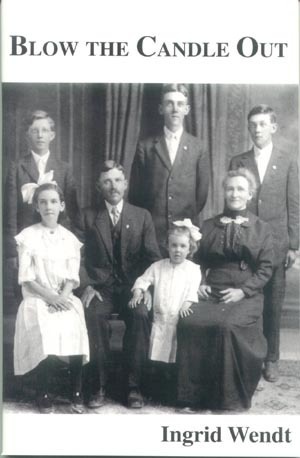Blow the Candle Out

Blow the Candle Out comprises two poetic sequences – “Learning the Mother Tongue,” which first appeared in Prairie Schooner, and “Questions of Mercy,” which first appeared in Nimrod International Journal – and explores what it means to have a German heritage in the United States.
“The universal meaning of ‘family’ merges with this particular family in these powerful poems, but they also engage the hard questions of guilt and innocence in World War II. I would say if you’re buying one poetry collection this year, make it this one-you won’t be sorry.
All books are available, new and used, through your local independent bookstore, online at the usual sites, or from the author here:
Excerpts from Blow the Candle Out
from “Learning the Mother Tongue” (a poem in 17 parts)
1.
It’s wicked, I know, but sometimes I can’t help feeling just
the tiniest glee when my good German friend, whose English tongue
has mastered the footwork of all Swan Lake ballet, stumbles over
the English translation of wenn, saying “if” when she really means
“when,” and vice versa,
while I, good German American, keep
clumping along: learning the word Kopfsalat, for example (“head
lettuce”), so proud of myself: first time in the land of all four
grandparents, shopping for salad, asking the produce clerk “Haben Sie ein Kopf, bitte?” “Ja, natürlich,” she answers. “Und Sie?”
- **********
4.
Always the question: Did our Illinois family speak German at home?
During the war years in which I was born? Let’s qualify:
Father born 1902 in Chile. Mother, 1911, in Michigan. There, that does it.
Except for the shadow. (Fit in. Fit in. What else is there to know?)
- **********
5.
And still, “Mach schnell!” (when I was too slow).
“Strewwelpeter!” (my hair was a mess).
“Dreh dich rum,” my mother would say in her Schwabian mother’s
tongue, never, of course, outside of the family, never
translating: sporadic spices her tongue dished out without
one of us questioning. Look!
In this textbook, the recipes: words with real
meanings attached. “Make quick!” “Naughty
child from Heinrich Hoffmann’s pen!” It’s not
after all, just
family oddness, not
baby talk. Look at
this middle-aged tongue abandon its teetering. This
fabulous, sturdy new foot!
(More)
- ###
From “Questions of Mercy” (a poem sequence in 16 parts)
2. What is wrong with this picture?
Here are the famous Medieval cathedrals,
stone on stone on stone, just
as history books show them to be.
Here is the new stained glass by Chagall.
Here, unobtrusive, the flat-faced, modern
city apartments, their uniform
windows that open two ways. As always,
the ancient clock on the village town hall.
Here are the temples, the synagogues, gold
domes shining–modern, the architects’
vision, preserving what’s old.
Here are the guards, outside of the walls.
Here is the Römerplatz, Fachwerked again,
beguiling, surrounding the central fountain,
cups and glasses clinking; in winter
the Christmas market, hot Glühwein, bright stalls.
Here, the new bright clusters of poppies:
every village roof-tile, a blossom.
Winding streets, their floods of geraniums.
Each house with its fresh, whitewashed wall.
Here, wide-open, the fields for Sunday
walks, year-round, so green, the forests
so carefully tended, the vineyards.
Nowhere, nowhere, did anyone fall.
Here are the camps, open to tourists.
Green wreaths on the train station wall.
The names of those who took those trains.
The attempts to remember them all.
Here, the monuments.
There, the monuments.
Everywhere, the open acknowledgment.
What other absence dares sit on my heart?
~ ~ ~ ~ ~
4.
“Saatfrüchte sollen nicht vermahlen werden”
— Johann Wolfgang von Goethe
Father of Jürgen, lost
wherever your submarine went down:
your son has become an architect, working his way
up, from stage one. If only you could see his own home,
angled just so, so the sun, precisely at noon, will shine
through one small window: high, high, just under the roof.
Father of Olivia, lost
who knows where: your daughter’s
a teacher, she can’t forget finding, when she
was twenty, your photo, your Wehrmacht uniform (so it
was true!), your parents, insisting the ending was wrong.
When she can, she asks poets and Jews to speak at her school.
Father of Volker (professor of
Geography): he learned at twelve you fell
with the SS in Hungary. Every Sunday the family
dinner: the East German question, your absence everyone
skirted around. He’s taken a photo of where you fell, a flower.
He speaks this line from a poem: What we seek for has no place.
Fathers whose names must not be spoken
Fathers we don’t know how to mourn
Fathers who may not be in Heaven
Fathers who didn’t come home
Father who did, who lived,
for your son’s first six years, behind bars
of a Russian prison camp, your son–named for your
best friend shot down over England–your son has become
a pastor, the father of four, a concert organist. Big man. Jolly man.
All his life he has hated his name.
5.
And here is my betrayal, my shame:
Last summer, in Norway, nearly
everyone I met was delighted: “Ingrid,
that’s a Norwegian name!”
“Yes,” at first I said, “it is.
But really, I’m German, I’m named for
Ingeborg, my German-Chilean cousin.”
“Yes,” I learned
to say. “Ingrid is
a Norwegian name.”
###
Nature photographs and written content © Ingrid Wendt, unless otherwise cited.